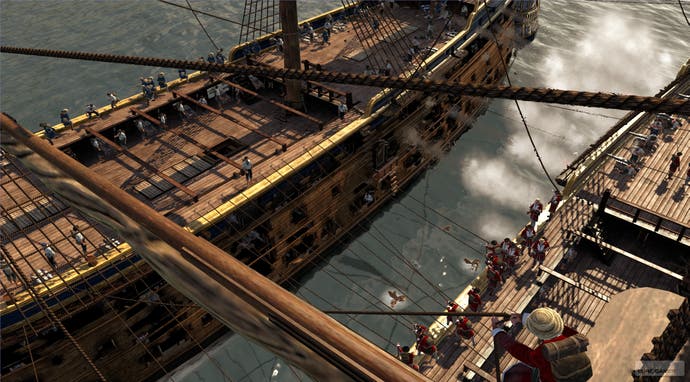Empire: Total War
18th Century Boy.
There are some niggles, as you'd expect of a game that isn't finished; you don't choose the angle at which you fire the cannons, and too often, my cannon fired harmlessly around my target. Demanding to know why this was, with a cross whine in my voice, I discovered other factors were at play - the relationship between my boat's firing range and the distance of the enemy ship, wind, weather (in the full game - our seas were calm and sunny) - but still, the reload time is long enough to make it frustrating when you score a complete miss. "It's good to see other people playing it," comments our guide. "You do a lot of things that we'd never do." With the suspicion that my warfaring skills have just been subtly served, I retire from active duty after an hour.
Even historical games are forced into a compromise between reality and gameplay, and Total War has always had a bit of fun with reality. Creative Assembly has included a number of exotic and invented units in its time, not to mention its fondness of elephants. Similar has happened in the sea battles. In naval combat, fights could be drawn out over a period of days, as ships manoeuvred to re-engage the enemy to their own advantage. CA has also discarded the need for tacking - the counter-intuitive process by which a Northerly wind carries you most quickly North-East or North-West. You can still gain some advantage by plotting your course at 45 degrees to the wind, but you won't need a thorough grounding in sailing in order to play.
On the other hand, some weapons are very real, even if they're unheard of. The Puckle Gun - named after its inventor, James Puckle, and designed for use against Christians and Turks - is a victim of history. The world's first machine-gun, a lack of investment caused it to fail in 1718. Needless to say, you'll be able to use it here.
What's hugely impressive, as ever, is the visuals. There's always been a sense of awe as you sweep down to the battlefield, but never more so than when you sweep in like a nosey god to survey the damage to your ship - or if you've capsized your enemy, to click purposelessly on his overboard crew.
Other innovations include the AI - formerly a chess-based AI, thinking dozens of moves ahead, it now has a prioritised to-do list, with items constantly evaluated as to whether it's best equipped - or required - to achieve them. It sounds interesting, but AI is a nebulous old bird, and how this translates into sensible-seeming decisions won't be clear until the review stage. But the plan to develop the computers' personality, and unify the thinking between the turn-based and real-time elements of the game is promising.

In the RTS battles on land, you can move large blocks of troops and have them retain their formation in relation to each other, and the use of muskets makes new formations more suitable to ranged units. For example, archers can walk around in blocks - they don't have to be in the front line to fire on the enemy, but muskets are a much more horizontal affair, and shooting the bloke in front is frankly bad for morale. So you can form a long, thin line to increase your firepower - the drawback being that this presentation is easily broken through. It all has an impact, though - present your forces as more impressive than they are, and it'll be intimidating to the AI. It's a matter of presenting your troops in the strongest possible light, even if it's just you and a bunch of scarecrows. Bear in mind who you're fighting, though - as usual, every general will have his own style.
Meanwhile, back in the turn-based part of the game, a tech-tree will allow you to research down the faster-moving technologies of the 18th Century. Obviously, it's no Civ in terms of scope, but there's enough to ensure that you won't max out your tree in one game; you'll be forced to neglect some branches if you want to reach the end of any others. A new way of winning is the Prestige victory condition, allowing you to succeed by becoming the most well thought of and thoroughly awesome leader. It's not like a culture win in Civ, though - part of the process of becoming so prestigious is to win a lot of battles, and defeat a lot of enemies.
This is pure PC strategy, in a century that's more interesting than it may first appear. With digital delivery handled by Steam, updates can be issued easily. With one eye to the future - CA develops for the technology that will be around - and the other on scalability, everyone will be able to get a very long war out of Empire. You'll just need a slightly more powerful PC if you want the reflections of 9,999 soldiers to be in every other soldier's tin hat.
They're famously involved games, and daunting in their detail and scope. But with CA's continued insistence on making the game as simple, complicated, automated or micromanaged as the player wants it to be, Empire should continue the Total War trend of outselling itself with every release.



